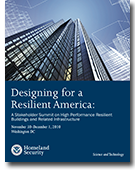 by U.S. Department of Homeland Security, 2010
by U.S. Department of Homeland Security, 2010
From the Executive Summary
Given the gravity of manmade and natural hazard events of the last decade, designing buildings that not only offer resistance, but continue to function after a catastrophic event, are significant challenges to government and the building industry.
The National Infrastructure Advisory Council (NIAC) has recommended better understanding of the role of design and construction in infrastructure resilience.
Designing for a Resilient America: A Stakeholder Summit on High Performance Resilient Buildings and Related Infrastructure, was held at the American Institute of Architects in Washington, D.C., on November 30−December 1, 2010.
At the summit, national hazards and building experts developed comprehensive recommendations for increasing resiliency in six areas. These need the attention of the highest levels of government — the President, Congress, and ranking staff of the Department of Homeland Security and other Federal agencies.




